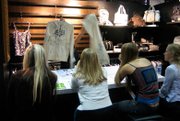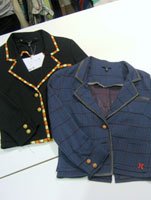Sunny Styles Combat Sluggish Winter at Surf Expo
ORLANDO, FLA.—Fresh off a sluggish holiday season, buyers converged on Orlando, Fla., for the Jan. 10–13 run of Surf Expo to shop for Summer 2008 and, in some cases,Fall. The Orange County Convention Center, which was divided into Surf, Skate, Swim, Boutique and Resort categories, played host to 1,200 exhibitors and 15,000 attendees. Absent from this edition of Surf Expo were wake-boarding and wind-surfing brands, which sit out the January show in favor of the larger September show.
“The mood on the show floor was good. Exhibitors were cautiously optimistic and buyers were still buying,” said Dan Darby, the show’s marketing director. “Also, our attendance was the same as [last January]. I guess we’ll just have to wait and see how the summer plays out.”
While many exhibitors noted that traffic in the aisles seemed light, none complained that buyers were being overly cautious with their buys, despite a lackluster holiday.
“We got no indication of a soft retail market for our brand, as the orders and sell-through indicators are nothing but positive,” said Jesse Faen, head of Insight, a surf/skate lifestyle brand. “I did hear talk of bigger brands feeling a pinch, but that is not our concern or focus. We have mountains to climb before even being comparable with the most established U.S. brands.
So, for now, we are simply doing all we can to provide the retailers with a fresh take on things and give the consumers something to get excited by.”
Other brands defied the slowing economy by launching upscale product lines at the show. Billabong, which showed Summer 2008 fashions, debuted its Designer’s Closet collection: a capsule of fashion-forward pieces with better fabrication and a higher price point. Included in the new collection are dark, high-waist denim trousers, sequined vests, mini-dresses with gold rope details and ruffle-front blouses. Wholesale price points for Designer’s Closet range from $11 to $38.
Fox Racing, which produces a line of limited-edition apparel that includes a $350 leather jacket and premium denim, reported strong sales of its high-end fleece and sneakers. Jim Anfuso, Fox’s director of marketing, said that while retailers are wary of a recession, they are buying what sells—even if bears a bigger price tag. “We haven’t felt the hit yet, but we are expecting to see a slowdown of business,”Anfuso said. “It seems inevitable, so we’re preparing and keeping in touch with our buyers to keep a close eye on the situation.”
Hurley appealed to preppy tomboys with fleece schoolboy blazers, fleece peacoats and argyle-print sweater vests. Upscale pieces, including a leather motorcycle vest that wholesales for $77 and silk dresses in pop-art colors, appealed to an older, more-sophisticated customer.
Rip Curl kept up its momentum by offering tried-andtrue styles in updated colorways and weights for Fall 2008. Dresses, which checked well for Spring, were offered in styles that can be layered for Fall. For guys, signature athlete boardshorts and “fashion fleece” proved to be key for East Coast buyers. Rip Curl launched new denim programs for men and women at Surf Expo. “Denim for us used to be virtually nonexistent,” said Amy Olson, director of merchandise and design for girls. The new collections, which include organic denim, feature 10 styles for men and four styles for women. “It is a much more fashionforward approach,” Olson said. The women’s denim collection includes a slim pencil skirt and skinny, flare, boot and trouser silhouettes.
Reef showed Summer styles and offered international buyers a peek at Fall 2008. Key looks for the season included ’80s-inspired graphics and silhouettes—think fleece muscle tanks and Members Only–style jackets. Lightweight fabrics and pops of color on T-shirts and fleece carried over into Fall. Denim was also a focus at Reef, which expanded its collection from a single piece to four styles in a variety of washes. “Denim is such a hard category, but we finally found the right partner, and we’re really proud of what we’re able to offer,” said Lindy Williams, Reef’s girls’ marketing director.
Rusty, which brought its first collection under its newlicense with La Jolla Group, packed its booth with buyers eager to see the brand’s new offerings. Charlie Setzler, Rusty’s president, said the relaunched brand offers fashion-forward surf flavor mixed with core staples, including branded T-shirts and basic boardshorts. “We’ve got more directional pieces and the meat and potatoes,” he said. Fits for men’s Fall 2008 and juniors Summer 2008 are slimmer than under Rusty’s previous licensee. “We’re aiming for a younger customer, so the fit had to evolve, as well,” Setzler said. Guys got urban-inspired, graffiti-tinged graphics; girls got skinny jeans and candy- colored tops.
The Hundreds, an urban-inspired lifestyle brand from Los Angeles, made its first trek to Surf Expo. Sales Manager Scott Litel said the surf/skate market is a growing focus for the brand. “It used to be that our distribution was 50/50 skate and boutique. Now, it is more like 70 percent skate, 30 percent boutiques,” he said. Part of the reason is that core shops have more staying power than boutiques, “which pop up fast and then go away,” Litel added. To delve further into core shops, The Hundreds is working on developing product with price points more in line with the surf/skate market. “Our T-shirts retail for around $29. That’s a bit more than most [skate/surf] brands, which sell at about $22,” he said.
Much of the buzz on the show floor had to do with Quiksilver’s recent decision to sell direct online—a move that alienated many of the brand’s key retailers who saw their online business take a dive. While Quiksilver’s booth showed no signs of a lack of interest, reps for independent and upand- coming brands see retailers’ disenchantment with the key player as an opportunity to grow their own distribution.
“It would make sense [for retailers to turn to independent brands]. That’s what the industry is based on—having unique product, not selling brands that you can buy at Mervyn’s or all over the Internet. If core stores buy smaller independent brands, they’ll stand out again,” said Dustin Odbert, founder of Ambission, an Arroyo Grande, Calif.–based brand. JohnnyMonson, co-owner of Allyance, a new fashion-driven line of men’s snow/surf/skate apparel, agreed. “That situation has given us a great invitation to come out and party. It’s time for a change,” he said.























